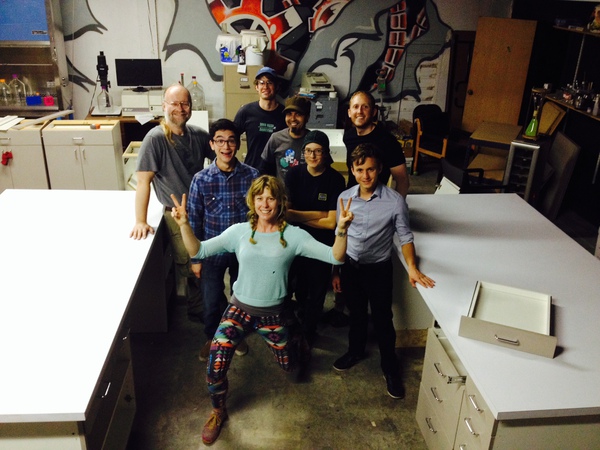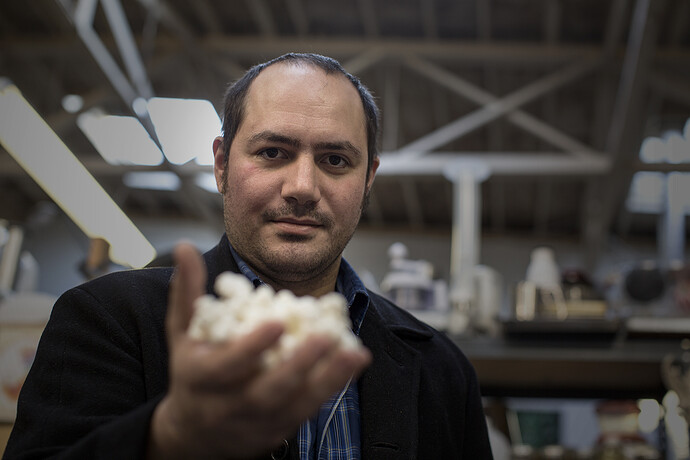Open Insulin is one of many projects at Counter Culture Labs, a biohacker space in Oakland, CA. Counter Culture Labs was founded around 2011-2012 by a group of hackers with diverse backgrounds and interests. Members joined us from Sudo Room, another hacker space in Oakland, and Biocurious, a biohacker space in Sunnyvale. Many were also involved in Occupy Oakland, and wanted to establish a more permanent organization with the same community spirit and values. Eventually, the community we built in the hacker space reached a critical mass of knowledge and interest around the idea of starting to producing insulin with a manual protocol, but one designed to be simpler and less expensive than existing methods. We named the project “Open Insulin” to reflect a commitment to make the results freely available to any interested party and publish our methods openly. The name was a deliberate reference to open source software.
Open source, as many readers may know from the software world, is the practice of making all information necessary to produce and modify a product publicly available along with the product itself. It started in software as an alternative to the practice of providing only machine-readable copies of programs, which can’t be understood or practically changed by users of the software. Without access to human-readable code, users and other stakeholders were shut out of their own tools. Open source methods of production are relevant not just to aligning incentives and improving the economics of software development, but also to scientific reproducibility and transparency, and in both software and science, open source can enable more participation and progress than trying to hold secrets close. In medicine in general, and diabetes treatments in particular, I think it holds one of the keys to breaking through the barrier between promising research and a stagnant market of treatments available to patients, just as it made software much more efficient to produce and use and enabled a great deal more innovation than was otherwise possible.

Open source software and the hacker culture that makes it was a major inspiration for biohackers to organize as such. “Biohacker” derives from the term “hacker” in the sense used in the communities of early pioneers of computing, where it’s a term used to refer to people who seek to understand how things work on the inside, instead of just using products as a consumer. Hackers are people who seek to modify things to serve their own purposes, instead of just accepting them as being limited to their originally intended purposes. It’s an approach that emphasizes the philosophical concepts of phronesis and techne, which describe an embodied, contextualized, practical approach to things, applied to science and technology. Biohackers are people who take a practical approach to understanding and engineering biological systems, and look beyond appearances and inside the black boxes of commercial products to understand the substance and true implications of things.
If we can achieve the creation of open source insulin, it could contribute to at least three important goals - first, by making insulin production more economical at a smaller scale, and opening up manufacturing to much more competition, it could improve cost and access for patients. Second, we hope the protocol will serve as a basis for future research into improvements to insulin - variants that are longer acting, shorter acting, more temperature stable, and so on - that address different concerns that arise in treatment. Third, we hope it might serve as a basis for research and production of other proteins by small groups, and open up participation in research and development to accelerate progress in other aspects of diabetes treatment besides insulin and other areas of science and medicine besides diabetes treatment.
Currently we’re working on a novel method to produce human insulin, which is not patented, and as far as I know is not patentable. There are variations on normal human insulin to make them longer or shorter acting, which involve very small changes to the sequence that codes for human insulin.
We’ve been working in the lab for about 10 months, and we’re just seeing the first signs of success on our first major milestone, the production of proinsulin, which is the precursor to insulin. Once we’ve verified our success there, we’ll move on to making the final form of insulin.
We face two main challenges. First, while we are a group of talented and curious folks, most of us are learning challenging lab protocols from scratch, and second, we’re working with limited amounts of time and money, fitting the work into gaps in our schedules left by work or school, and mainly relying on surplus equipment and reagents that add delays and uncertainties to our work. So progress can be slow and involve a lot of detours on top of those implied by the already uncertain nature of scientific investigation, and we have to dig deep to figure out what to do next when something goes wrong. We do our best to learn fast, but it’s difficult to follow up on everything we should with our limited time and resources and background knowledge. There’s a lot of practical wisdom around making insulin that doesn’t show up directly in the papers published in scientific journals, and we’re learning these nuances of making things work as we go. Much of the value we hope to provide to the community is documenting as much of this practical wisdom as we can, and perhaps eventually automating the kind of work we’re doing by hand right now.
If all goes well, we hope our techniques will be available to people with diabetes, especially to help meet the needs of people in resource-poor and lower-income countries. However, it’s hard to say at this point when we might be able to deliver a result useful for making a pharmaceutical-grade product. After the scientific work, which might take a few years, there will be the work of seeking business partnerships and going through more engineering work and the biosimilar approval process in the US. In other areas of the world, it may be simpler, but might also involve more unusual local political considerations. We’re hoping that our work will inspire others to move in parallel alongside us and increase the chances that one group will succeed quickly, and there are some preliminary signs that this is happening, which could yield results sooner. But there’s no doubt we’re at the start of a very long and winding road.
We’ve had the good fortune to have many experts in relevant fields reach out to advise us to smooth out our path, but many important questions remain, and the most important ones remain for us to find new answers. Scientists who are reading this – can we count on you to contribute your expertise in protein expression and purification? Organizers – can you share with us your vision for expanding these efforts into a movement with participation from parallel groups like ours around the world?
The production of this article was supported by Op3n Fellowships - an ongoing program for community contributors during May - November 2016.


